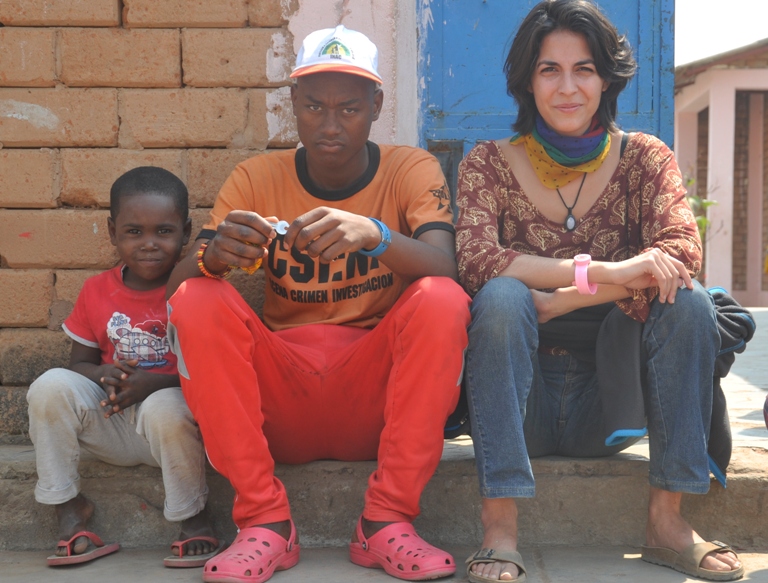“Kutala aims to convey the realities facing socially at-risk children through their own eyes”
“Kutala aims to convey the realities facing socially at-risk children through their own eyes”
Mariona Ibáñez is a graduate in Journalism and Humanities by UPF. This year she has undertaken project Kutala, an artistic initiative that, through photography, seeks to make socially at-risk children from all over the world heard.
 Mariona Ibáñez is a graduate in Journalism and Humanities by UPF. Besides her great interest in culture and art, she has always been highly sensitive towards children and their education. This year she has undertaken project Kutala, which means “look” in Kimbundu, the language of the north-western Angola, an artistic initiative that, through photography, seeks to make socially at-risk children from all over the world heard.
Mariona Ibáñez is a graduate in Journalism and Humanities by UPF. Besides her great interest in culture and art, she has always been highly sensitive towards children and their education. This year she has undertaken project Kutala, which means “look” in Kimbundu, the language of the north-western Angola, an artistic initiative that, through photography, seeks to make socially at-risk children from all over the world heard.
-Where does your concern that led you to launch a charity project like Kutala stem from?
Kutala is made up of a group of volunteers linked to the humanities and artistic creativity. With this project we aim to fuse our knowledge in the field of creativity with our social concerns. Some of the team of volunteers of Kutala have previous cooperative experience, but this is the first time we have directly linked a volunteer project with our creative pursuits.
-What are the project’s goals?
Kutala aims to provide children and young people at risk of social exclusion with emotional education through photography. Through workshops we have held in Barcelona and are planning to hold in Malanje (Angola), we intend to work in a very natural way on such aspects as self-esteem, relations with the environment and managing emotions.
Another of the project’s goals is to convey the reality of these children at risk of social exclusion through their own eyes. They are often situations that, if we ever hear of them, come via communication professionals who do not live on a day-to-day basis with the problems they relate. Giving the children cameras and for them to explain their experiences seems to us to be a different way of familiarizing people with these realities.
-How does all this materialize?
The project began with pilot workshops at the Centre Socioeducatiu Poblenou - Fundació Pere Tarres in Barcelona. In collaboration with the centre’s educators over a period of ten weeks we organized activities related with analogue photography. The aim of the workshops is to prepare children so that they can do a small personal photography project on a topic with which they have a strong emotional link (family, friends, pets...), with an analogue camera that we provide them with.
The results of this experiment (analysed together with the professionals at the centre) have been very positive, and now we are focusing on Malanje, where we will conduct the second phase, with workshops at an orphanage in Vila Matilde, a troubled district of the city.
- Kutala has been able to go ahead thanks to the Verkami platform. What advantages and what setbacks have you encountered with crowdfunding?
In the case of Kutala, in addition to the Verkami patrons, we have been fortunate enough to have the help of companies like Casanova Foto and Nostàlgic Barcelona Photostore, who have provided material and given us major discounts. These partnerships have enabled us greatly to bring down the target of the Verkami campaign.
The distinctiveness of crowdfunding over other methods of funding is its social component: parallel with the financial help it represents, it allows you to reach people outside your circles and, therefore, allows you to publicize the project. To some extent, this means subjecting your proposal to the public opinion. Kutala has aroused interest and has quickly reached its goal, it has been very satisfactory.
However, this method has its limitations, and finding channels to disseminate the campaign can pose quite a challenge. In our case we were fortunate enough to be selected by the Verkami channel of the Vilaweb platform, which published the link to our campaign on the home page of its website.
- What is it about the project that “fills” you most?
It is very rewarding to see how what you studied at university can end up having an impact on social improvement through a personal project. The entire Kutala team are very happy with the creation of this innovative charity project that it is going so well. In addition, we’re excited to return to Angola where, thanks to our previous experiences we have made friends and forged special ties.
- What have you gained from having done two degrees like Journalism and Humanities?
I think these studies are not so different and are highly complementary. Basically, both degrees offer the tools to acquire a knowledge of the world in different ways: one, via thought and culture throughout history; the other, from the present, but with a critical viewpoint that precisely feeds from humanistic knowledge.
- What is your most lasting impression of your time spent at the Faculty?
Obviously, your university years are very intense, and that always involves discoveries beyond the classroom. In my case, I think that my time at the UPF Theatre Workshop was crucial for my personal and professional growth in many different aspects. It helped me connect with some of my classmates and with myself in a far more direct and emotionally enriching way.
